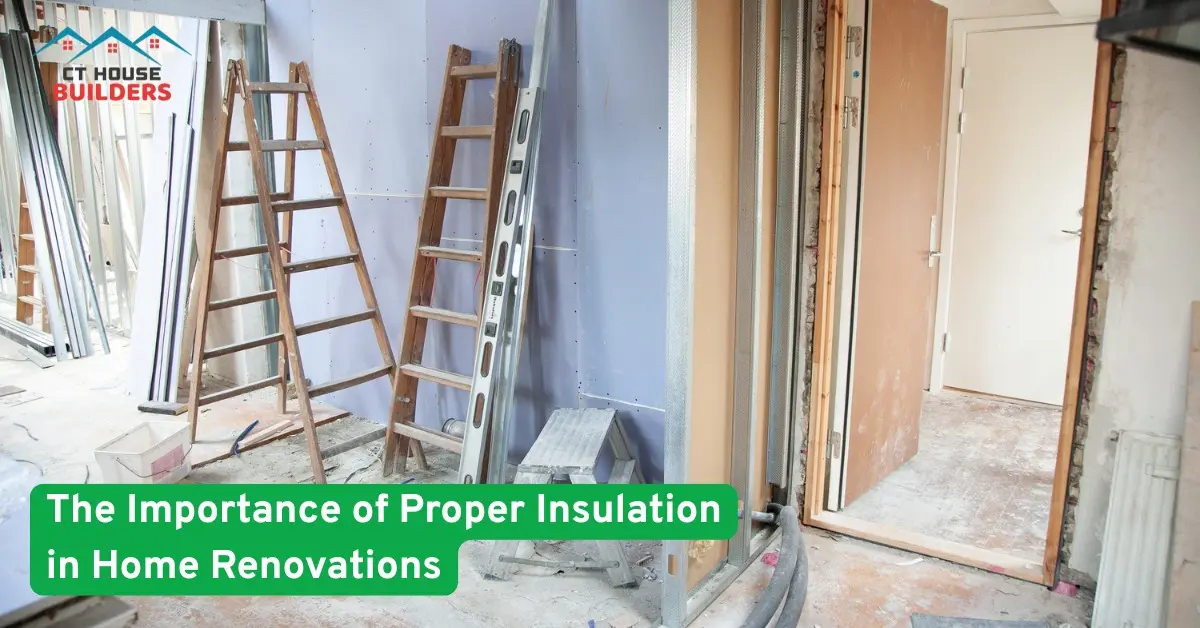When it comes to home renovations, homeowners often focus on aesthetics, layout, and design. However, one critical aspect that should never be overlooked is insulation. The Importance of Proper Insulation in Home Renovations is more than just about keeping your home warm in winter or cool in summer—it’s an investment in your home’s long-term comfort, energy efficiency, and overall value. In fact, studies show that homes with proper insulation can save up to 20% on energy bills annually, making it an essential component of any successful renovation project.
Why Proper Insulation Matters in Home Renovations
Insulation is more than just a barrier against the elements. Proper insulation helps maintain a comfortable indoor temperature year-round, while also ensuring that your HVAC system works efficiently. When you renovate your home, adding or upgrading insulation can significantly impact your heating and cooling costs, leading to a noticeable reduction in energy bills. But that’s not all. Effective insulation also helps to reduce noise, making your home quieter and more peaceful.
Renovations often open up opportunities to address areas of your home that may have inadequate or outdated insulation. Attics, walls, floors, and basements are key areas where insulation can play a crucial role in enhancing your home’s energy efficiency. Adding insulation to these spaces during a renovation not only improves comfort but also ensures that your home is better protected from external weather conditions.
How Proper Insulation Benefits Your Home Renovation
-
Energy Efficiency and Cost Savings:
One of the primary reasons for including insulation in home renovations is its ability to improve energy efficiency. Proper insulation acts as a barrier that slows the transfer of heat, keeping your home cooler in the summer and warmer in the winter. This results in less reliance on heating and cooling systems, which translates into lower energy bills. Studies indicate that up to 40% of the energy used in homes is lost due to poor insulation. By addressing insulation during your renovation, you can enjoy substantial savings on energy costs.
-
Improved Indoor Comfort:
Insulation is crucial for maintaining consistent indoor temperatures. Without adequate insulation, hot or cold air can easily escape, causing temperature fluctuations throughout the home. Proper insulation ensures that every room in your home stays comfortable, no matter the season. This improvement in temperature regulation can make your home much more pleasant to live in, whether you’re entertaining guests or simply relaxing.
-
Enhanced Noise Reduction:
Another often-overlooked benefit of proper insulation is its ability to reduce noise. Insulating walls, floors, and ceilings can greatly decrease sound transmission between rooms, helping to create a more peaceful living environment. This is especially important in open-concept homes or in areas near noisy streets. By adding insulation during your renovation, you can enjoy quieter spaces, which is ideal for work, relaxation, or family time.
-
Increased Property Value:
Homes with proper insulation are generally more desirable to buyers, as they are seen as more energy-efficient and environmentally friendly. Insulation can also help improve your home’s overall air quality by preventing drafts and moisture buildup, which can lead to mold growth. As a result, a home with proper insulation during renovations is more likely to fetch a higher price on the market.
-
Environmental Impact
Proper insulation is not only beneficial for your home, but it also has positive effects on the environment. By reducing energy consumption, well-insulated homes contribute to a decrease in greenhouse gas emissions. Energy-efficient homes use fewer resources to maintain comfortable temperatures, making insulation a crucial element in reducing your carbon footprint.
When Should You Consider Insulating During Home Renovations?
You may already be planning a renovation for your home, but you might not be considering insulation as part of the project. Here are some scenarios where insulation should be a top priority:
- Renovating the attic or roof: Adding insulation to the attic can significantly reduce heat loss and energy consumption, especially in older homes where attic insulation may be lacking.
- Adding or updating walls: Whether you’re expanding your living space or simply updating the look of your walls, it’s a great opportunity to improve insulation and enhance energy efficiency.
- Finishing a basement or crawl space: Basements and crawl spaces are notorious for being poorly insulated, leading to drafts and moisture problems. During renovations, these areas are prime candidates for insulation upgrades.
- Upgrading windows and doors: While focusing on new windows and doors during a renovation, consider pairing them with high-quality insulation around the frames for optimal performance.
Frequently Asked Questions (FAQs)
- Why is insulation important during home renovations?
Insulation ensures energy efficiency, reduces heating and cooling costs, improves indoor comfort, and increases the value of your home.
- Can I add insulation to my home if it wasn’t included in the original construction?
Yes, it’s possible to add insulation during home renovations, particularly in attics, walls, basements, and floors.
- What types of insulation are best for home renovations?
Common options include fiberglass, spray foam, cellulose, and rigid foam board. The best choice depends on your specific needs and budget.
- How much energy can proper insulation save on my energy bills?
Proper insulation can save up to 20% on annual energy costs by reducing heat loss and improving HVAC efficiency.
- How long does it take to install insulation during a renovation?
The time it takes depends on the scope of the renovation. However, insulation installation typically only adds a few days to the overall project timeline.
- Can insulation improve soundproofing in my home?
Yes, insulation helps reduce noise transmission between rooms, making your home quieter and more peaceful.
- Should I insulate my home if I live in a mild climate?
Yes, even in mild climates, insulation helps maintain consistent indoor temperatures, reduces energy consumption, and enhances overall comfort.
- Is it necessary to replace old insulation during a renovation?
If your existing insulation is damaged, outdated, or inefficient, replacing it during renovations can improve energy efficiency and indoor comfort.
- Does insulation increase the resale value of my home?
Yes, homes with good insulation are more attractive to buyers due to lower energy costs and improved comfort, increasing the property’s value.
- How do I know if my home needs more insulation?
Signs of poor insulation include drafts, inconsistent temperatures, high energy bills, and excessive moisture or mold in certain areas of your home.
Transform Your Home with Expert Insulation Solutions from CT House Builders
At CT House Builders, we understand that proper insulation is a crucial element of any successful renovation project. With years of experience, our expert team ensures that your home is not only beautiful but also energy-efficient, comfortable, and sustainable. Whether you’re renovating a single room or an entire home, we provide tailored insulation solutions to meet your needs and exceed your expectations.
Upgrade Your Home with Expert Insulation for Comfort, Savings, and Value
When renovating your home, don’t overlook the importance of proper insulation in home renovations. By investing in high-quality insulation, you’ll improve energy efficiency, enhance comfort, reduce noise, and increase your home’s value. Contact CT House Builders today to discuss your renovation needs and take the first step towards a more energy-efficient home.
Let us help you transform your space with the right insulation for lasting comfort and savings.




